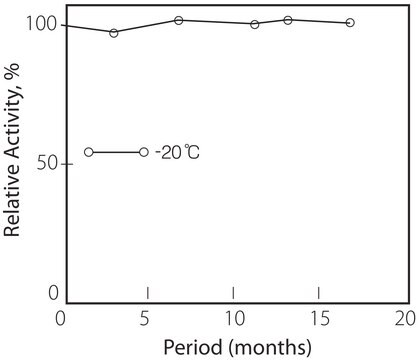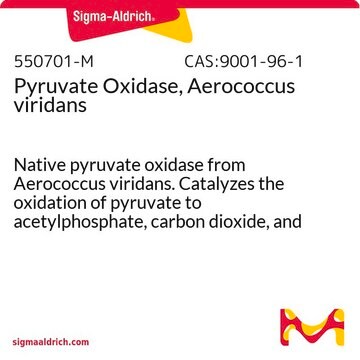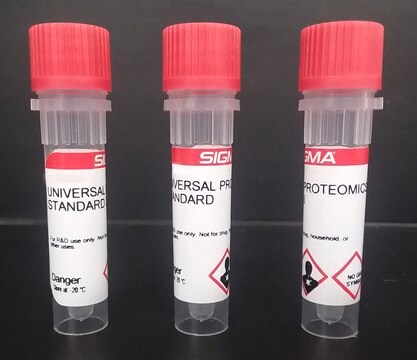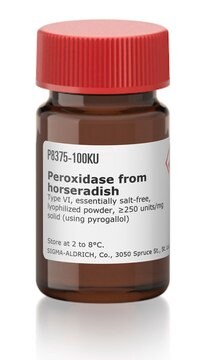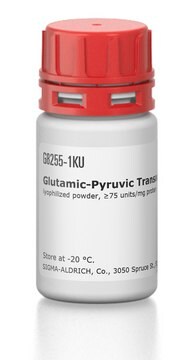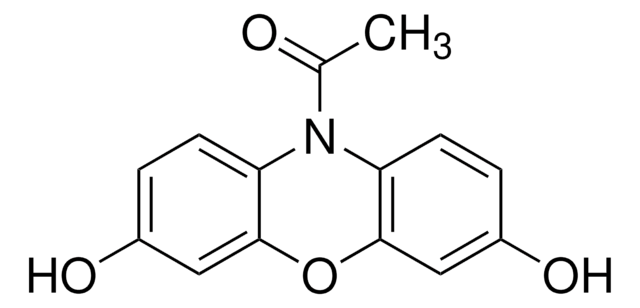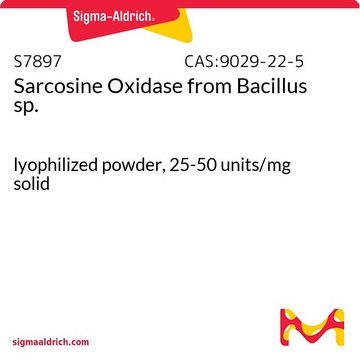P4105
Pyruvate Oxidase from Aerococcus sp.
lyophilized powder, ≥35 units/mg protein (biuret)
Sinónimos:
Pyruvate: oxygen oxidoreductase (phosphorylating)
Iniciar sesiónpara Ver la Fijación de precios por contrato y de la organización
About This Item
Productos recomendados
biological source
bacterial (Aerococcus spp.)
Quality Level
form
lyophilized powder
specific activity
≥35 units/mg protein (biuret)
storage temp.
−20°C
Application
Pyruvate Oxidase (PoxB) converts pyruvate directly to acetate and CO2. It is used to study pyruvate metabolism. It is used to study aerobic metabolism of bacterium, such as Lactobacillus plantarumand Streptococcus pneumoniae.
Pyruvate Oxidase from Aerococcus sp. has been used in the amplex Red-based fluorescence assay for pyruvate. It is suitable for use in the preparation of biosensor for determination of thiamine (vitamin B1), and as a component in the constant part of the multi-enzyme biocatalytic cascade for the determination of biomarkers for traumatic brain injury (TBI) and soft tissue injury (STI).
Biochem/physiol Actions
Pyruvate Oxidase consists of four subunits with identical molecular weights. PoxB reacts with certain aldehydes and phosphate can be replaced by arsenate. Oxygen as well as several artificial compounds can function as electron acceptors. Pyruvate Oxidase is activated by phospholipids as well as monomeric and micellar amphiphiles.
Pyruvate Oxidase oxidises pyruvate to form acetate, hydrogen peroxide and carbon dioxide. Pyruvate oxidase requires flavin adenine dinucleotide (FAD), thiamine pyrophosphate (TPP) and magnesium as cofactors for its catalytic activity. Thiamine activates pyruvate oxidase activity.
Unit Definition
One unit will produce 1.0 μmole of H2O2 per min during the conversion of pyruvate and phosphate to acetylphosphate and CO2 at pH 6.7 at 37 °C.
Physical form
Lyophilized powder containing buffer salt and sugar
signalword
Danger
hcodes
pcodes
Hazard Classifications
Resp. Sens. 1
Storage Class
11 - Combustible Solids
wgk_germany
WGK 3
flash_point_f
Not applicable
flash_point_c
Not applicable
ppe
Eyeshields, Gloves, type N95 (US)
Certificados de análisis (COA)
Busque Certificados de análisis (COA) introduciendo el número de lote del producto. Los números de lote se encuentran en la etiqueta del producto después de las palabras «Lot» o «Batch»
¿Ya tiene este producto?
Encuentre la documentación para los productos que ha comprado recientemente en la Biblioteca de documentos.
Los clientes también vieron
Hiroaki Taniai et al.
Journal of bacteriology, 190(10), 3572-3579 (2008-03-18)
Streptococcus pneumoniae was shown to possess lactate oxidase in addition to well-documented pyruvate oxidase. The activities of both H(2)O(2)-forming oxidases in wild-type cultures were detectable even in the early exponential phase of growth and attained the highest levels in the
B Sedewitz et al.
Journal of bacteriology, 160(1), 462-465 (1984-10-01)
Under aerobic growth conditions Lactobacillus plantarum produced acetic acid in addition to lactic acid. It was found that lactic acid was predominantly produced at first, and then when the carbohydrate was nearly exhausted, lactic acid was metabolized further to acetic
Multi-enzyme logic network architectures for assessing injuries: digital processing of biomarkers
Halamek J, et al.
Molecular Biosystems, 6(12), 2554-2560 (2010)
B Sedewitz et al.
Journal of bacteriology, 160(1), 273-278 (1984-10-01)
Pyruvate oxidase (EC 1.2.3.3) was isolated and characterized from Lactobacillus plantarum. The enzyme catalyzes the oxidative decarboxylation of pyruvate in the presence of phosphate and oxygen, yielding acetyl phosphate, carbon dioxide, and hydrogen peroxide. This pyruvate oxidase is a flavoprotein
A sensitive fluorimetric assay for pyruvate
Zhu A, et al.
Analytical Biochemistry, 396(1), 146-151 (2010)
Nuestro equipo de científicos tiene experiencia en todas las áreas de investigación: Ciencias de la vida, Ciencia de los materiales, Síntesis química, Cromatografía, Analítica y muchas otras.
Póngase en contacto con el Servicio técnico